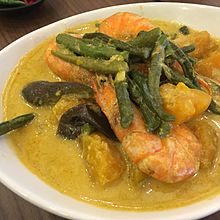Ginataang kalabasa facts for kids

Ginataang kalabasa with shrimp, yardlong beans, and eggplant
|
|
| Alternative names | Kalabasa sa gata, Nilatik na kalabasa, Squash in coconut milk, Kabasi ha gata Pinggata a babasal |
|---|---|
| Course | Main course |
| Place of origin | Philippines |
| Serving temperature | Hot |
| Main ingredients | calabaza, coconut milk |
Ginataang kalabasa (say "gee-nah-TAH-ang kah-lah-BAH-sah") is a yummy Filipino dish. It's a vegetable stew made with a special type of squash called calabaza. This squash is cooked in creamy coconut milk with different spices.
Often, people add shrimp and long green beans (called yardlong beans) to it. They also use bagoong (a salty paste made from fermented fish or shrimp) or patis (fish sauce) to give it a rich flavor. You can also find versions with fish, crab, or even meat! It's a creamy, slightly sweet dish because of the squash. It's a type of ginataan, which means "cooked in coconut milk."
What's in a Name?
Ginataang kalabasa is popular all over the Philippines. It has many different names depending on where you are. In English, it's often called "squash in coconut milk."
Here are some other names for it:
- Dinuldog in Cebuano
- Kalabasa sa gata in Tagalog
- Kabasi ha gata in Tausug
- Pinggata a babasal in Maguindanao
- Nilatik na kalabasa in Hiligaynon
Sometimes, the name changes based on what else is added. For example, if shrimp is in it, it might be called ginataang kalabasa at hipon. If yardlong beans are added, it's ginataang kalabasa at sitaw.
Even if another ingredient seems like the main one, it's still a type of ginataang kalabasa. For instance, ginataang alimango (with mud crabs) and ginataang alimasag (with blue crabs) still include calabaza.
If the dish has many different vegetables, it might be called ginataang gulay, which means "vegetables in coconut milk."
How It's Made
Making ginataang kalabasa is quite simple! The main ingredients are:
- Cubed calabaza (the squash)
- Coconut milk (called gata)
- Thicker coconut cream (called kakang gata)
- Ginger
- Onions
- Garlic
- Either bagoong (fermented fish or shrimp paste) or patis (fish sauce)
- Salt and pepper for taste
First, the garlic and onions are lightly fried in a pan. Then, the coconut milk and other ingredients are added. This mixture cooks slowly until the squash becomes very soft. Finally, the coconut cream is stirred in and cooked on low heat until the sauce gets thick and creamy.
Some modern recipes might use monosodium glutamate (MSG) or other seasonings instead of shrimp paste or fish sauce.
Different Ways to Cook It
This dish is very flexible, so there are many ways to make it! The most common additions are yardlong beans (cut into about 5 cm pieces) and shrimp.
You can also add:
- Fish
- Crab
- Meat (often pork)
If you like spicy food, you can add siling haba (long green chili peppers) or labuyo (small, very hot chili peppers).
Other vegetables that can be included are:
- Moringa leaves (malunggay)
- Tomatoes
- Squash blossoms
- Eggplant
- Okra
Sometimes, in places outside the Philippines, people might use butternut squash or kabocha squash instead of calabaza.
For those who don't eat meat or seafood, a vegan or vegetarian version can be made. This uses mushroom sauce instead of fish sauce or shrimp paste, and no meat or seafood is added.
Ginataang kalabasa is special because it always has calabaza. Other ginataan dishes, like ginataang hipon (shrimp in coconut milk) or ginataang ampalaya (bitter gourd in coconut milk), don't include this type of squash.

